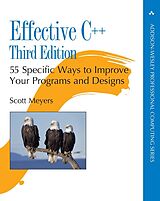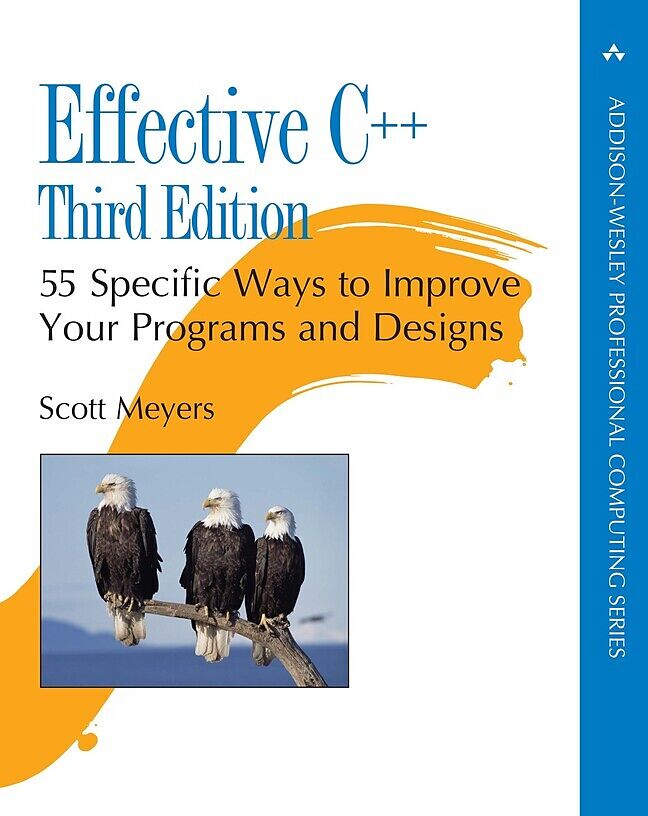Effective C++: 55 Specific Ways to Improve Your Programs and Designs
Einband:
Kartonierter Einband
EAN:
9780321334879
Untertitel:
55 Specific Ways to Improve Your Programs and Designs
Autor:
Scott Meyers
Herausgeber:
Addison Wesley
Auflage:
3. Auflage
Anzahl Seiten:
320
Erscheinungsdatum:
12.05.2005
ISBN:
978-0-321-33487-9
Effective C++ 3/e is a complete update of Effective C++ and Effective C++ 2/e .
Like its predecessors, 3/e has 55 guidelines which contain better, more
effective ways to write code, backed by specific examples. The second edition
published in 1997, and was basically a face-lift of the first edition, keeping most
of the same elements, and seven years later is still selling well.
Now, Meyers has dramatically rejuvenated the material, including more than
30% brand-new material. Meyers began this edition by asking himself, "What
are the 55 most important pieces of advice for practicing C++ programmers in
2005?" He also asked thousands of past users of his books this same question.
This resulted in a completely new book. New material includes use of UML
notation, thread safety, exception safety, design patterns, and templates. Any
older material has been revitalized to reflect new ideas and strides in C++
development.
Every C++ professional needs a copy of Effective C++. It is an absolute must-read for anyone thinking of doing serious C++ development. If you've never read Effective C++ and you think you know everything about C++, think again.
Steve Schirripa, Software Engineer, Google C++ and the C++ community have grown up in the last fifteen years, and the third edition of Effective C++ reflects this. The clear and precise style of the book is evidence of Scott's deep insight and distinctive ability to impart knowledge.
Gerhard Kreuzer, Research and Development Engineer, Siemens AG The first two editions of Effective C++ were embraced by hundreds of thousands of programmers worldwide. The reason is clear: Scott Meyers' practical approach to C++ describes the rules of thumb used by the experts the things they almost always do or almost always avoid doing to produce clear, correct, efficient code. The book is organized around 55 specific guidelines, each of which describes a way to write better C++. Each is backed by concrete examples. For this third edition, more than half the content is new, including added chapters on managing resources and using templates. Topics from the second edition have been extensively revised to reflect modern design considerations, including exceptions, design patterns, and multithreading. Important features of Effective C++ include: Expert guidance on the design of effective classes, functions, templates, and inheritance hierarchies. Applications of new TR1 standard library functionality, along with comparisons to existing standard library components. Insights into differences between C++ and other languages (e.g., Java, C#, C) that help developers from those languages assimilate the C++ way of doing things.
Autorentext
Scott Meyers is one of the world's foremost authorities on C++, providing training and consulting services to clients worldwide. He is the author of the best-selling Effective C++ series of books (Effective C++, More Effective C++, and Effective STL) and of the innovative Effective C++ CD. He is consulting editor for Addison Wesley's Effective Software Development Series and is a founding member of the Advisory Board for The C++ Source (http://www.artima.com/cppsource). He holds a Ph.D. in Computer Science from Brown University. His web site is http://www.aristeia.com.
Klappentext
Every C++ professional needs a copy of Effective C++. It is an absolute must-read for anyone thinking of doing serious C++ development. If you've never read Effective C++ and you think you know everything about C++, think again.
Steve Schirripa, Software Engineer, GoogleC++ and the C++ community have grown up in the last fifteen years, and the third edition of Effective C++ reflects this. The clear and precise style of the book is evidence of Scott's deep insight and distinctive ability to impart knowledge.
Gerhard Kreuzer, Research and Development Engineer, Siemens AG The first two editions of Effective C++ were embraced by hundreds of thousands of programmers worldwide. The reason is clear: Scott Meyers' practical approach to C++ describes the rules of thumb used by the experts the things they almost always do or almost always avoid doing to produce clear, correct, efficient code. The book is organized around 55 specific guidelines, each of which describes a way to write better C++. Each is backed by concrete examples. For this third edition, more than half the content is new, including added chapters on managing resources and using templates. Topics from the second edition have been extensively revised to reflect modern design considerations, including exceptions, design patterns, and multithreading. Important features of Effective C++ include: Expert guidance on the design of effective classes, functions, templates, and inheritance hierarchies. Applications of new TR1 standard library functionality, along with comparisons to existing standard library components. Insights into differences between C++ and other languages (e.g., Java, C#, C) that help developers from those languages assimilate the C++ way of doing things.
Zusammenfassung
Organized around 55 specific guidelines, each of which describes a way to write better C++, this book reflects on modern design considerations, including exceptions, design patterns, and multithreading. It also provides guidance on the design of effective classes, functions, templates, and inheritance hierarchies.
Inhalt
Preface xvAcknowledgments xviiIntroduction 1Chapter 1: Accustoming Yourself to C++ 11Item 1: View C++ as a federation of languages. 11 Item 2: Prefer consts, enums, and inlines to #defines. 13 Item 3: Use const whenever possible. 17 Item 4: Make sure that objects are initialized before they're used. 26Chapter 2: Constructors, Destructors, and Assignment Operators 34Item 5: Know what functions C++ silently writes and calls. 34 Item 6: Explicitly disallow the use of compiler-generated functions you do not want. 37 Item 7: Declare destructors virtual in polymorphic base classes. 40 Item 8: Prevent exceptions from leaving destructors. 44 Item 9: Never call virtual functions during construction or destruction. 48 Item 10: Have assignment operators return a reference to *this. 52 Item 11: Handle assignment to self in operator=. 53 Item 12: Copy all parts of an object. 57Chapter 3: Resource Management 61Item 13: Use objects to manage resources. 61 Item 14: Think carefully about copying behavior in resource-managing classes. 66 Item 15: Provide access to raw resources in resource-managing classes. 69 Item 16: Use the same form in corresponding uses of new and delete. 73 Item 17: Store newed objects in smart pointers in standalone statements. 75Chapter 4: Designs and Declarations 78Item 18: Make interfaces easy to use correctly and hard to use incorrectly. 78 Item 19: Treat class design as type design. 84 Item 20: Prefer pass-by-reference-to-const to pass-by-value. 86 Item 21: Don't try to return a reference when you must return an object. 90 Item 22: Declare data members private. 94 Item 23: Prefer non-member non-friend functions to member functions. 98 Item 24: Declare non-member functions when type conversions should apply to all parameters. 102 Item 25: Consider support for a non-throwing swap. 106Chapter 5: Implementations 11…

Leider konnten wir für diesen Artikel keine Preise ermitteln ...
billigbuch.ch sucht jetzt für Sie die besten Angebote ...
Die aktuellen Verkaufspreise von 6 Onlineshops werden in Realtime abgefragt.
Sie können das gewünschte Produkt anschliessend direkt beim Anbieter Ihrer Wahl bestellen.
Loading...
Die aktuellen Verkaufspreise von 6 Onlineshops werden in Realtime abgefragt.
Sie können das gewünschte Produkt anschliessend direkt beim Anbieter Ihrer Wahl bestellen.
| # | Onlineshop | Preis CHF | Versand CHF | Total CHF | ||
|---|---|---|---|---|---|---|
| 1 | Seller | 0.00 | 0.00 | 0.00 |
